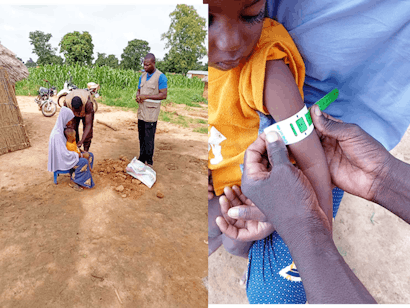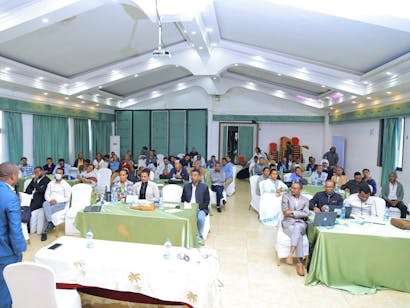From Exclusion to Empowerment
How CASCADE Is Transforming Intra-household Dynamics in Ethiopia

In Ethiopia’s Amhara region, many women face deep-rooted social and cultural norms that limit their voice in household decisions and burden them with disproportionate responsibilities. Across rural communities like Libokemkem Woreda, these norms shape daily life, leaving women with little say over family resources or their children’s wellbeing.
Tiringo Mihret represents the plight of many women of the Libokemkem Woreda, and the Amhara region of Ethiopia more broadly. As a 23-year-old mother of two, Tiringo carried a massive burden due to the gender norms that exclude women from their own family’s decision-making and expect them to manage their household alone.
“Most household activities were my responsibility,” explains Tiringo, telling the CASCADE team that her husband worked on the farm, and that both she and her husband believed all household duties were hers.
What’s more, Ato Gezachew Ebabu Tiringo’s husband, would make decisions on behalf of the entire family, including her. “Whatever we owned, he would make the sole decision as to whether we kept it or sold it” adds Trigo. She was expected even to ask for Gezachews’s permission to attend community gatherings
CARE’s Gender Equality FrameworkIntrahousehold dynamics describes how power, roles, and decision-making work within a family—who controls resources, who makes choices about food, health, education, and who does which tasks. These internal relationships shape who gets voice, whose needs are met, and how household resources are allocated.
When CASCADE first encountered Tiringo, she would have a limited diet of cereals and legumes, selling the butter and eggs at the market to buy other commodities such as coffee and oil. Her daughter, Kalkidan Gezachew, whom Tiringo admits has been vulnerable to health problems, was diagnosed by a nearby health facility as suffering from issues linked to an unbalanced diet.
As many women do in the region, she observed the Ethiopian Orthodox Fasting, which restricts use of animal sourced foods, even when not mandated by the church, such as when Tringo was pregnant with two of her kids.
From Silence to Voice
Today Tiringo is empowered. In May 2024, she participated in several activities of the CASCADE project – a project implemented by the Global Alliance for Improved Nutrition and CARE Ethiopia – leading to her transformation from a passive participant in her family’s life to a formidable voice in her family and community.
It all started when she became a member of her local Social Analysis and Action (SAA) Group, set up by CASCADE, in which she joined discussions around challenging negative gender and social norms. “After being a member of the group,” says Tiringo, “I had the chance to identify what norms affect me and other women at the household, and in the community.” As a result of this, she’s one of the many women reporting a shift in the way decisions are made in her home, as well as having a balanced workload.
Tiringo made a point to engage her husband throughout her time in the SAA group. “I always update my husband of what I have learnt in the sessions. It has taken some time, but his understanding is improving, and he’s become so supportive! Now he takes care of the kids,cooks for them and feeds them, he also supports me in fetching water and grinding cereal at the mill.”
From Meals to Mindsets
Of all the changes she’s made, she’s particularly proud of the way she feeds herself and her kids. “We talk about what makes a nutritious meal, and our level of access to nutritious foods is increasing over time. Now I pay attention to the food I give my kids!” From what she learned in her group, she has adopted adding milk, eggs, ground meat, vegetables, cereals, legumes, and oil crops to her son’s and daughter’s diet.
The CASCADE project provided the family with pullets, and the household consumes eggs regularly, unless they’re fasting, but the children have full-time access.Beyond consumption, the surplus eggs are sold at the market, and now the income is used to supplement food gaps to include fruits and vegetables which they do not grow at home. “I don’t like eggs myself,” admits Tiringo, “but I do have other animal products, like milk and milk products.” Tiringo still observes her fasting, but as a lactating mother, has made a point to use other varieties of food, keeping all mealtimes.
The difference is visible. Tiringo looks very healthy and she informed the CASCADE team that her children’s health has already improved. Critically, she has become a beacon among her neighbours, who have started to practice these things in their own homes. Tiringo is one of many such examples that lift their communities by starting at home, and she’s happy to have played such a pivotal role in her own household’s attitude towards gender and social norms. From the group, around 8 lactating mothers replicated her success and demonstrated changes in attitude on challenging negative norms that affect their gender roles and healthy diet consumption.
Authored by :
Atinkut Agegnehu
CARE Ethiopia, CASCADE ProjectPolicy and Advocacy Specialist


